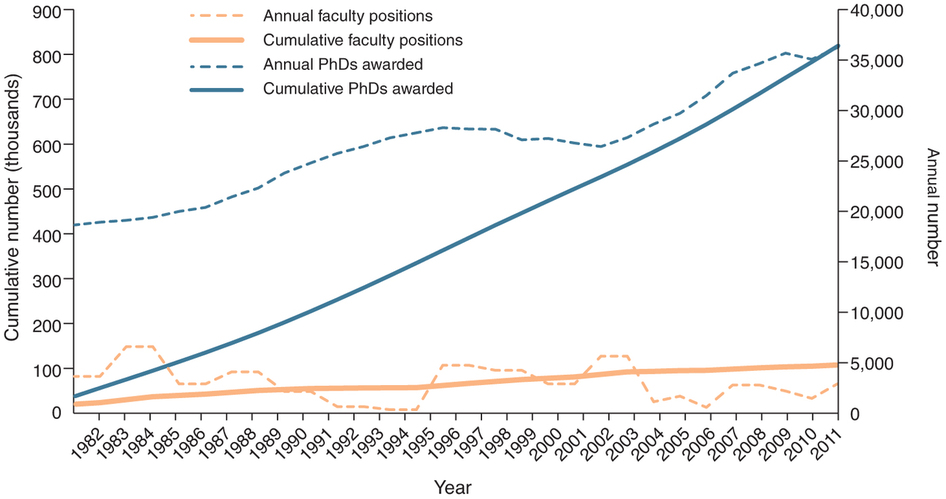|
![]()
5. Few postdocs have realistic prospects of a regular faculty position These
1 #290417The postdoc population, which has grown very rapidly in U.S. universities and is recruited increasingly from abroad, looks more like a pool of low-cost research lab workers with limited career prospects than a high-quality training program for soon-to-be academic researchers. Indeed, if the truth be told---only a very small percentage of those in the current postdoc pool have any realistic prospects of gaining a regular faculty position. |
New faculty positions versus new PhDs 
Source: Nature Biotechnology 31, 938–941 (2013) doi:10.1038/nbt.2706 "Since 1982, almost 800,000 PhDs were awarded in science and engineering (S&E) fields, whereas only about 100,000 academic faculty positions were created in those fields within the same time frame. The number of S&E PhDs awarded annually has also increased over this time frame, from ~19,000 in 1982 to ~36,000 in 2011. The number of faculty positions created each year, however, has not changed, with roughly 3,000 new positions created annually." |
+Verweise (2) - VerweiseHinzufügenList by: CiterankMapLink[2] Testimony before the Subcommittee on Technology and Innovation Committee on Science and Technology U.S. House of Representatives
Zitieren: Michael S. Teitelbaum - Vice President, Alfred P. Sloan Foundation
Publication info: 2007 November, 6
Zitiert von: David Price 8:56 PM 12 October 2013 GMT
Citerank: (12) 2904071. Serious shortages of scientists and engineers in the USThere are serious shortages or shortfalls in the U.S. of scientists and engineers – either current shortages/shortfalls, or “looming” ones – that bode ill for the creativity and competitiveness of the U.S. economy.959C6EF, 2904082. Insufficient new science and engineering graduates for employersThe numbers of newly-educated scientists and engineers graduating from U.S. universities are reported to be insufficient for the needs of U.S. employers, even though the 2 science careers they are offering are growing rapidly and are attractive and well-remunerated. Some argue that it is this insufficiency that really compels U.S. high-tech firms to offshore increasing fractions of their R&D work, and to hire increasing numbers of scientists and engineers from abroad to “fill the gaps”.
959C6EF, 2904093. K-12 education in science and math is weak in USThe argued insufficiencies of supply are due to the weakness (or even “failure”) of U.S. K-12 education in science and math.959C6EF, 2904104. US student interest in science and engineering careers is decliningU.S. students are showing declining interest in science and engineering careers, even though these are growing strongly.959C6EF, 2904115. Post-doc status offers excellent training for young scientistsThe “postdoc” status found in growing numbers in most U.S. research universities offers an excellent training opportunity for young scientists before they enter into the promising academic research careers that lie before them.959C6EF, 2904126. Large government investment is neededThe Congress should respond to these realities by providing large government investments to increase the number of students completing majors in science and engineering fields, and in increasing the flow of Federal research dollars to these fields.959C6EF, 2904131. No evidence of shortages of scientists or engineersNo one who has come to the question with an open mind has been able to find any objective data suggesting general “shortages” of scientists and engineers. The RAND Corporation has conducted several studies of this subject; its conclusions go further than my summary above, saying that not only could they not find any evidence of shortages, but that instead the evidence is more suggestive of surpluses.959C6EF, 2904142. More scientists and engineers graduating than career openingsThere are substantially more scientists and engineers graduating from U.S. universities that can find attractive career openings in the U.S. workforce. Indeed science and engineering careers in the U.S. appear to be relatively unattractive--- relative that is to alternative professional career paths available to students with strong capabilities in science and math.959C6EF, 2904153. More K-12 students studying science & math – and performing betterStudents emerging from the oft-criticized K-12 system appear to be studying science and math subjects more, and performing better in them, over time. Nor are U.S. secondary school students lagging far behind comparable students in economically-competitive countries, as is oft-asserted.959C6EF, 2904164. Freshmen still plan to complete majors in science and engineeringLarge and remarkably stable percentages of entering freshmen continue to report that they plan to complete majors in science and engineering fields; however, only about half of these ultimately do so.959C6EF, 2904186. Rapid rises in federal funding may further destabilze career pathsRapid increases in Federal funding for scientific research and education is more likely than not to further destabilize career paths for junior scientists. Under the current structure, the effect is substantial growth in “slots” for PhD students and postdocs to conduct the supported research, but only limited increases in the numbers of career positions (I will give you a concrete and large example in a moment).959C6EF, 290419State of the US science and engineering workforceExploring the sufficiency of the U.S. science and engineering workforce for the current and future R&D enterprise, and potential impacts of globalization.609FDDBE URL:
|
|
|